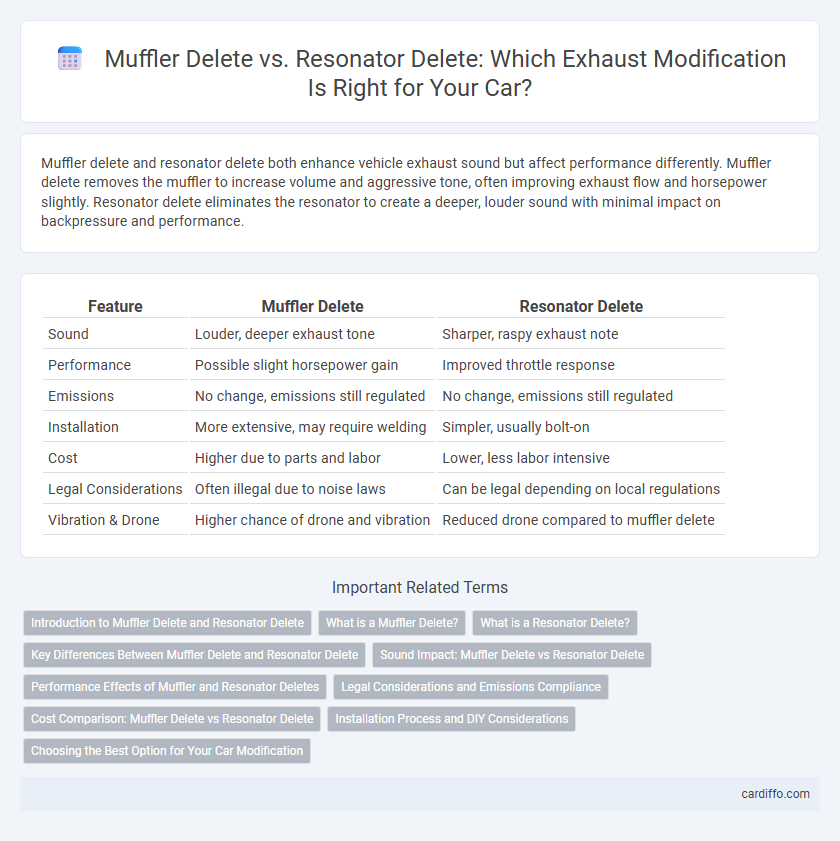Muffler delete and resonator delete both enhance vehicle exhaust sound but affect performance differently. Muffler delete removes the muffler to increase volume and aggressive tone, often improving exhaust flow and horsepower slightly. Resonator delete eliminates the resonator to create a deeper, louder sound with minimal impact on backpressure and performance.
Table of Comparison
| Feature | Muffler Delete | Resonator Delete |
|---|---|---|
| Sound | Louder, deeper exhaust tone | Sharper, raspy exhaust note |
| Performance | Possible slight horsepower gain | Improved throttle response |
| Emissions | No change, emissions still regulated | No change, emissions still regulated |
| Installation | More extensive, may require welding | Simpler, usually bolt-on |
| Cost | Higher due to parts and labor | Lower, less labor intensive |
| Legal Considerations | Often illegal due to noise laws | Can be legal depending on local regulations |
| Vibration & Drone | Higher chance of drone and vibration | Reduced drone compared to muffler delete |
Introduction to Muffler Delete and Resonator Delete
Muffler delete involves removing the muffler to increase exhaust flow and create a louder, more aggressive sound. Resonator delete removes the resonator, which primarily reduces drone and refines exhaust tone without significantly altering volume. Both modifications impact the vehicle's acoustics and performance but target different aspects of the exhaust system.
What is a Muffler Delete?
A muffler delete involves removing the muffler from a vehicle's exhaust system to increase exhaust flow and produce a louder, more aggressive sound. This modification typically enhances engine performance by reducing backpressure but may increase noise levels beyond legal limits. Muffler deletes are popular among car enthusiasts seeking a sportier exhaust tone without altering the entire exhaust system.
What is a Resonator Delete?
A resonator delete involves removing the resonator from a vehicle's exhaust system to increase exhaust flow and produce a louder, more aggressive sound. Unlike a muffler delete, which eliminates the muffler for maximum noise, a resonator delete results in a deeper tone while retaining some noise reduction. This modification can improve engine performance by reducing backpressure but may also increase exhaust drone inside the cabin.
Key Differences Between Muffler Delete and Resonator Delete
Muffler delete removes the muffler, primarily increasing exhaust noise and horsepower by reducing backpressure, while resonator delete targets the resonator to alter exhaust tone and drone without significantly impacting performance. Muffler delete tends to produce a louder, more aggressive sound, whereas resonator delete offers a deeper, throatier exhaust note with less volume. Selecting between the two depends on desired sound level, performance goals, and legal compliance regarding noise regulations.
Sound Impact: Muffler Delete vs Resonator Delete
Muffler delete significantly amplifies exhaust volume by removing the primary sound-dampening component, resulting in a louder and more aggressive tone. Resonator delete alters the exhaust note by eliminating frequency-specific sound cancellations, often producing a raspier, higher-pitched exhaust sound without substantially increasing overall volume. Both modifications impact engine sound, but muffler delete creates a more pronounced noise change, while resonator delete fine-tunes tonal quality.
Performance Effects of Muffler and Resonator Deletes
Muffler delete increases exhaust flow rate by removing backpressure, resulting in a noticeable boost in horsepower and a more aggressive exhaust note. Resonator delete primarily alters the sound frequency, creating a louder and raspier tone without significantly improving engine performance or power output. Both modifications can impact drone levels and emissions, but muffler deletes typically offer more tangible performance gains compared to resonator deletes.
Legal Considerations and Emissions Compliance
Muffler delete modifications often violate noise ordinances and vehicle codes, resulting in fines and failed inspections, while resonator deletes generally produce less noise increase but can still affect emissions if paired with other exhaust changes. Emissions compliance relies on maintaining factory catalytic converter function, so any deletions that alter exhaust flow risk failing state emissions tests and inspections. Vehicle owners must verify local regulations and emissions standards before muffler or resonator removal to avoid legal penalties and ensure compliance with environmental laws.
Cost Comparison: Muffler Delete vs Resonator Delete
Muffler delete typically costs between $100 to $300, while resonator delete ranges from $150 to $350, depending on the vehicle and labor fees. Muffler deletes often involve simpler modifications, resulting in lower installation costs compared to resonator deletes, which may require more precise tuning. Overall, muffler delete offers a more budget-friendly option for those seeking an aggressive exhaust tone without extensive expenses.
Installation Process and DIY Considerations
Muffler delete typically involves removing the muffler and welding or clamping the exhaust pipes, requiring precise alignment to avoid leaks, while resonator delete replaces the resonator with a straight pipe, which is often simpler due to smaller size and fewer mounting points. DIY installation of muffler delete demands more tools and welding skills, whereas resonator delete suits enthusiasts with basic mechanical experience and standard hand tools. Both modifications can affect vehicle sound and emissions, so verifying local regulations before installation is essential.
Choosing the Best Option for Your Car Modification
Choosing between a muffler delete and a resonator delete depends on desired sound levels and vehicle performance goals. A muffler delete typically results in a louder, more aggressive exhaust note and can improve exhaust flow, while a resonator delete offers a deeper, drone-free tone without significantly increasing noise. Evaluating factors such as vehicle make, local noise regulations, and personal sound preference ensures the best choice for your car modification.
muffler delete vs resonator delete Infographic

 cardiffo.com
cardiffo.com